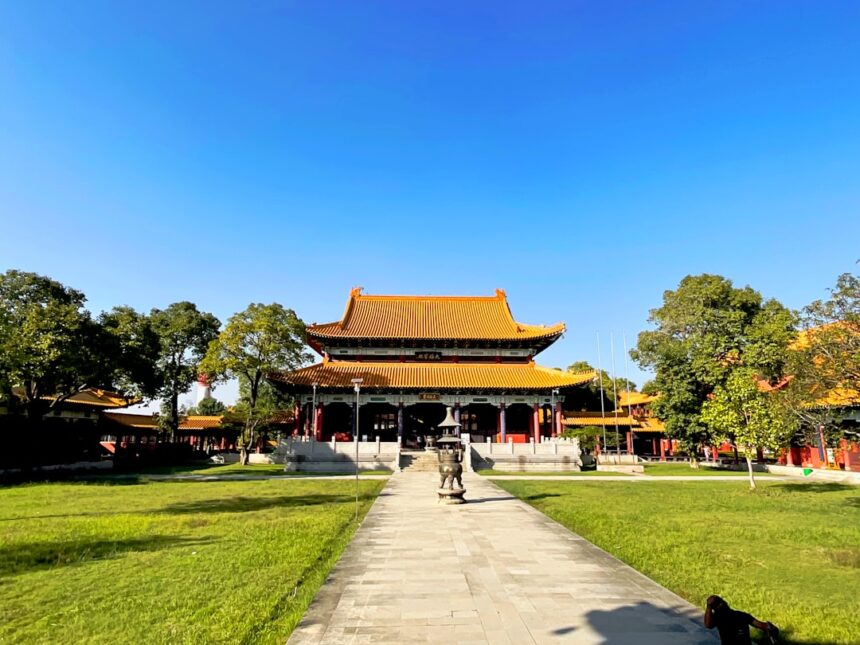As you embark on the journey of spiritual awakening, it’s essential to grasp what this transformative process entails. Spiritual awakening is not merely a moment of enlightenment; it is a profound shift in consciousness that alters your perception of reality. You may find yourself questioning long-held beliefs, feeling a deep connection to the universe, or experiencing heightened awareness of your thoughts and emotions.
This awakening can manifest in various ways, from sudden insights to gradual realizations, and it often leads you to explore deeper aspects of your existence. The process of spiritual awakening is unique for everyone, yet it typically involves a series of stages that guide you through self-discovery and growth. You might begin to notice synchronicities in your life, where events seem to align perfectly, or you may feel an overwhelming sense of love and compassion for yourself and others.
This journey can be both exhilarating and challenging, as it pushes you to confront your fears, release old patterns, and embrace new perspectives. Understanding this process is crucial, as it prepares you for the emotional and spiritual rollercoaster that lies ahead.
Key Takeaways
- The spiritual awakening process involves a deep understanding of oneself and the world around us.
- Initial excitement and euphoria are common experiences during the early stages of spiritual awakening.
- The dark night of the soul is a challenging phase that involves facing inner turmoil and emotional struggles.
- Dealing with fear and uncertainty is a crucial part of the spiritual awakening journey.
- The search for meaning and purpose becomes a central focus as individuals navigate their spiritual awakening.
The Initial Excitement and Euphoria
When you first experience a spiritual awakening, the initial excitement can be intoxicating. You may feel as if you’ve been granted access to a hidden realm of knowledge and understanding. This euphoric state often comes with a sense of clarity and purpose, as if the fog that once clouded your mind has lifted.
You might find yourself drawn to spiritual practices such as meditation, yoga, or mindfulness, eager to deepen your connection with the universe and explore the depths of your soul. During this phase, everything seems possible. You may feel an overwhelming sense of love and unity with all living beings, as if you are part of a grand tapestry woven together by the threads of existence.
This newfound awareness can inspire you to make significant changes in your life, whether it’s pursuing a new career path, engaging in creative endeavors, or fostering deeper connections with others. However, while this initial excitement is exhilarating, it’s important to remember that it is just the beginning of a much more complex journey.
The Dark Night of the Soul

As you continue on your spiritual path, you may encounter what is often referred to as the “Dark Night of the Soul.” This phase can feel like a stark contrast to the initial euphoria you experienced. It’s a time when you may confront deep-seated fears, unresolved traumas, and feelings of despair. You might find yourself questioning everything you once believed about yourself and the world around you.
This period can be incredibly challenging, as it forces you to face the shadows within. During the Dark Night of the Soul, you may feel isolated and disconnected from others. It’s common to experience feelings of sadness or hopelessness as you navigate through this emotional turmoil.
However, it’s essential to recognize that this phase is a crucial part of your spiritual growth. It serves as an opportunity for profound healing and transformation. By embracing the darkness and allowing yourself to feel these emotions, you can emerge stronger and more aligned with your true self.
Dealing with Fear and Uncertainty
| Metrics | Value |
|---|---|
| Number of people seeking counseling | 500 |
| Percentage increase in anxiety-related searches | 30% |
| Number of self-help books sold | 1000 |
Fear and uncertainty are natural companions on your spiritual journey.
You might worry about how these changes will affect your relationships, career, or sense of identity.
It’s important to acknowledge these feelings rather than suppress them. By facing your fears head-on, you can begin to understand their origins and learn how to navigate through them. One effective way to deal with fear is through mindfulness practices.
By grounding yourself in the present moment, you can create space for self-reflection and acceptance. Journaling can also be a powerful tool for processing your thoughts and emotions. Writing down your fears allows you to externalize them, making them feel less overwhelming.
Remember that uncertainty is a natural part of life; embracing it can lead to greater resilience and adaptability as you continue on your spiritual path.
The Search for Meaning and Purpose
As you delve deeper into your spiritual awakening, the search for meaning and purpose often becomes a central theme in your life. You may find yourself asking profound questions: What is my purpose? Why am I here? These inquiries can lead you on a quest for understanding that transcends material pursuits. You might explore various philosophies, spiritual teachings, or even engage in volunteer work that aligns with your values. This search for meaning can be both exhilarating and daunting. You may discover new passions or interests that resonate with your soul, guiding you toward a more fulfilling life. However, it’s essential to approach this search with patience and openness. The answers may not come immediately; instead, they often unfold gradually as you continue to grow and evolve.
Navigating the Shift in Relationships

As you undergo a spiritual awakening, it’s common for your relationships to shift significantly. You may find that some connections deepen while others fade away. This transformation can be challenging, especially if those around you do not share your newfound perspectives or interests.
You might feel misunderstood or isolated as you navigate these changes in your social circle. It’s important to communicate openly with those close to you about your experiences and feelings. Sharing your journey can foster understanding and connection, even if they don’t fully grasp what you’re going through.
Additionally, seek out like-minded individuals who resonate with your spiritual path; joining groups or communities focused on personal growth can provide support and encouragement during this transitional phase.
The Struggle with Loneliness and Isolation
Loneliness can be an unexpected companion during your spiritual awakening journey. As you evolve and change, there may be times when you feel disconnected from those around you. This sense of isolation can be particularly pronounced during the Dark Night of the Soul when introspection takes center stage.
It’s essential to recognize that these feelings are valid and part of the process. To combat loneliness, consider engaging in activities that nourish your spirit. Whether it’s spending time in nature, practicing self-care rituals, or exploring creative outlets, finding joy in solitude can help alleviate feelings of isolation.
Additionally, reaching out to others who share similar experiences can create a sense of community and belonging. Remember that while loneliness may feel overwhelming at times, it can also serve as an opportunity for self-discovery and growth.
Finding Inner Peace and Acceptance
As you progress through your spiritual awakening journey, finding inner peace becomes increasingly important. This state of tranquility allows you to navigate life’s challenges with grace and resilience. Cultivating inner peace often involves letting go of attachments to outcomes and embracing acceptance of what is.
You may find solace in meditation or mindfulness practices that help center your thoughts and emotions. Acceptance doesn’t mean resigning yourself to circumstances; rather, it’s about acknowledging reality without judgment or resistance. By practicing self-compassion and understanding that every experience contributes to your growth, you can foster a sense of peace within yourself.
This inner calm will serve as a foundation as you continue to explore the depths of your spirituality.
Embracing the Journey of Self-Discovery
Your spiritual awakening is ultimately a journey of self-discovery—a quest to uncover the layers of who you truly are beneath societal expectations and conditioning. Embracing this journey requires courage and vulnerability as you peel back the layers that no longer serve you. You may find yourself drawn to practices such as journaling or creative expression that allow for deeper exploration of your thoughts and feelings.
As you embrace this journey, remember that self-discovery is not a destination but an ongoing process. Each revelation brings new insights into your identity and purpose. Celebrate the small victories along the way; every step forward contributes to your growth and understanding of yourself in relation to the universe.
The Importance of Self-Care and Self-Compassion
Throughout your spiritual awakening journey, prioritizing self-care and self-compassion is vital for maintaining balance and well-being. As you navigate emotional highs and lows, taking time for yourself becomes essential in nurturing your spirit. Engage in activities that replenish your energy—whether it’s spending time in nature, practicing yoga, or indulging in creative pursuits.
Self-compassion involves treating yourself with kindness during difficult moments rather than harsh judgment. Acknowledge that everyone experiences challenges on their path; by extending compassion toward yourself, you create space for healing and growth. Remember that self-care isn’t selfish; it’s necessary for sustaining your energy as you continue on this transformative journey.
Integrating the Spiritual Awakening into Daily Life
Finally, integrating your spiritual awakening into daily life is crucial for maintaining momentum on your journey. This integration involves weaving newfound insights into your everyday routines—whether through mindful practices like meditation or simply being present in each moment. You might find joy in small rituals that honor your spiritual path, such as lighting candles during meditation or expressing gratitude daily.
As you navigate this integration process, remain open to adapting your practices as needed. Life will continue to present challenges; however, by grounding yourself in your spiritual insights, you can approach these challenges with greater clarity and resilience. Embrace each day as an opportunity for growth—your spiritual awakening is not just a phase but a lifelong journey toward deeper understanding and connection with yourself and the universe around you.
Experiencing tears during a spiritual awakening is a common phenomenon that many individuals encounter on their journey towards self-discovery and enlightenment. This emotional release can be attributed to the profound shifts in consciousness and the deep connection with one’s inner self that often accompany such awakenings. For those seeking to understand this experience further, an insightful article on the topic can be found on the Unplugged Psych website. This resource delves into the psychological and emotional aspects of spiritual awakenings, providing valuable perspectives and guidance. To explore this topic in more detail, you can read the related article by visiting Unplugged Psych.
FAQs
What is spiritual awakening?
Spiritual awakening is a process of self-discovery and personal transformation that often involves a deepening awareness of one’s connection to the universe or a higher power. It can involve a shift in consciousness, a newfound sense of purpose, and a greater understanding of the interconnectedness of all things.
Why do people cry during spiritual awakening?
People may cry during spiritual awakening for a variety of reasons. It could be due to the release of pent-up emotions, the overwhelming sense of connection and love, or the realization of deep truths about themselves and the world around them. Crying can be a natural and cathartic response to the intense emotions that often accompany spiritual awakening.
Is crying during spiritual awakening normal?
Yes, crying during spiritual awakening is a normal and natural response to the intense emotions and realizations that often accompany the process. It can be a way for individuals to release pent-up emotions, process deep insights, and experience a sense of emotional and spiritual release.
How can I support someone who is crying during their spiritual awakening?
If someone you know is crying during their spiritual awakening, it’s important to offer them support and understanding. You can provide a listening ear, offer comfort, and validate their emotions without judgment. It’s also important to respect their process and allow them the space they need to navigate their spiritual awakening in their own way.
When should I seek professional help for crying during spiritual awakening?
If the crying during spiritual awakening becomes overwhelming or begins to interfere with daily functioning, it may be beneficial to seek the support of a mental health professional. They can provide guidance, support, and resources to help navigate the intense emotions and experiences that can accompany spiritual awakening.




